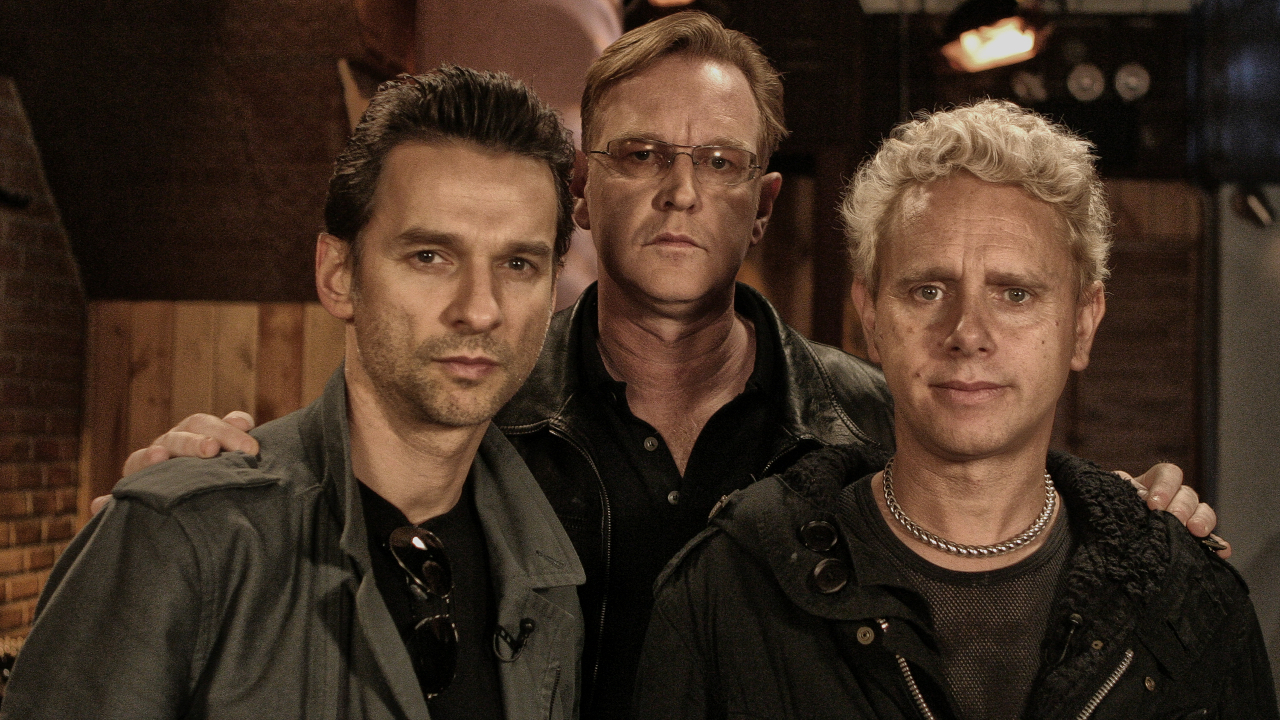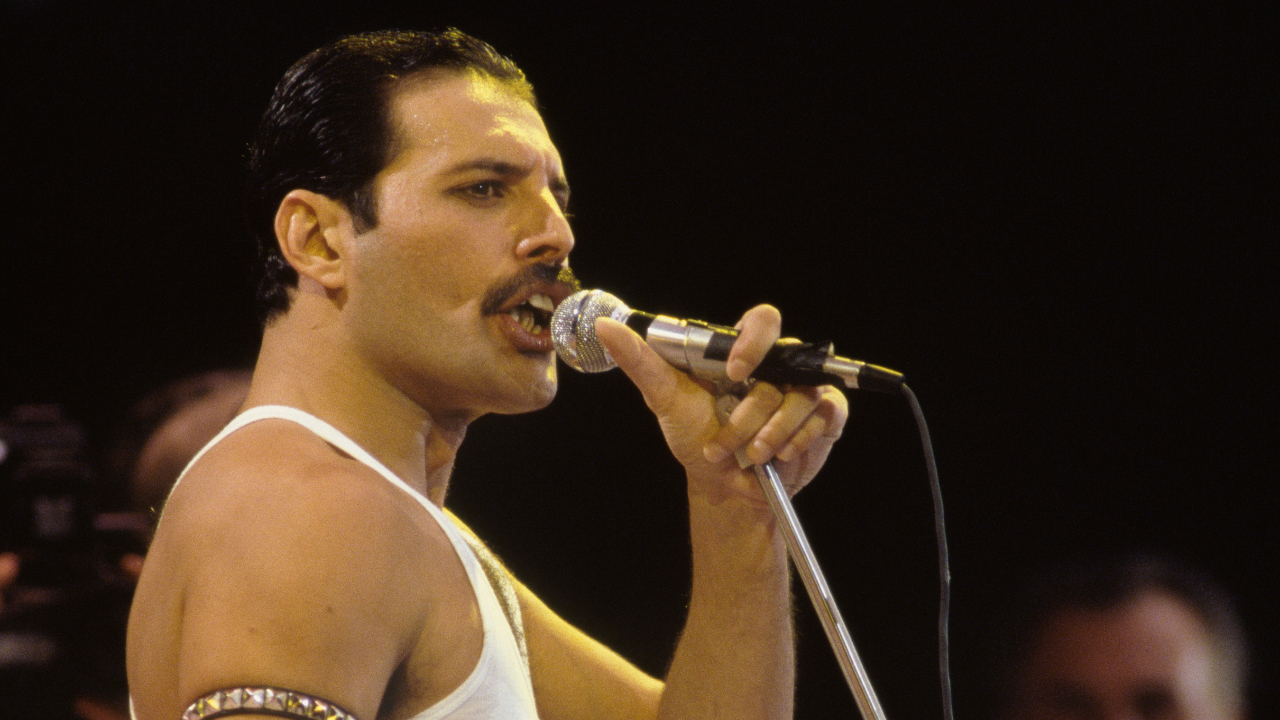Every Depeche Mode album ranked from worst to best
From synth-pop to industrial-noir, Depeche Mode have one hell of a catalogue. But which album is your Personal Jesus? Here's our guide to every studio album, worst to best

Select the newsletters you’d like to receive. Then, add your email to sign up.
You are now subscribed
Your newsletter sign-up was successful
Want to add more newsletters?

Every Friday
Louder
Louder’s weekly newsletter is jam-packed with the team’s personal highlights from the last seven days, including features, breaking news, reviews and tons of juicy exclusives from the world of alternative music.

Every Friday
Classic Rock
The Classic Rock newsletter is an essential read for the discerning rock fan. Every week we bring you the news, reviews and the very best features and interviews from our extensive archive. Written by rock fans for rock fans.

Every Friday
Metal Hammer
For the last four decades Metal Hammer has been the world’s greatest metal magazine. Created by metalheads for metalheads, ‘Hammer takes you behind the scenes, closer to the action, and nearer to the bands that you love the most.

Every Friday
Prog
The Prog newsletter brings you the very best of Prog Magazine and our website, every Friday. We'll deliver you the very latest news from the Prog universe, informative features and archive material from Prog’s impressive vault.
Everyone loves Depeche Mode don’t they? The Basildon, Essex synth-pop chart botherers turned dark industrialists, turned stadium filling, Rock and Roll Hall of Fame inductees have hoovered up members of every imaginable musical tribe as fans over their four-and-a-bit decades as a band.
They’ve also amassed a back catalogue that is as varied as that of pretty much any artist you care to mention, 15 full length studio albums, without ever really dropping the ball. Your personal favourite may depend on whether you’re a brooding, leather-clad goth, a decadent new romantic, a hedonistic club kid... or something else entirely.
Let's dive in...

15. A Broken Frame (1982)
You can trust Louder
When you’ve just had a massive worldwide smash on your first album, but the bloke who writes all your music decides to leave the band, you’re in something of a pickle. So, it’s hardly surprising that Depeche Mode needed an album to acclimatise to the situation after Vince Clarke departed to do his own thing, and was replaced by Alan Wilder, shortly after debut album Speak and Spell.
A Broken Frame is the sound of a band who desperately want to move on from their first album, but with this being Martin Gore’s opening crack at songwriting duties, aren’t quite sure exactly how to do that yet. Monument is great though.
14. Delta Machine (2013)
There’s nothing strictly wrong with Delta Machine, and it does have a few fine moments over its over-long 58-minute run time. Singles Sooth My Soul, a great cyber-disco romp, and vocalist Dave Gahan's suaveness on the swaying, Bond theme-esque Heaven are great, but there really isn’t much here that the band hadn’t already done to a higher standard.
If there aren’t any obvious problems here, the lukewarm critical reaction to the record was largely based on a gnawing sense that this was the sound of a band treading water. Not bad, but far from essential.
13. Construction Time Again (1983)
It’s probably worth at least investigating Construction Time Again for a variety of reasons, the most pressing one being that it’s really the first time in their career that Depeche Mode sound, well, weird. Pipeline, as an example, is nearly six minutes long and is a deeply awkward, industrial noise dirge that would have sent the band's early fans running a mile. They’d do it infinitely better later in their career, but it’s good to hear the band really stretching themselves here.
Obviously, the inclusion of the classic Everything Counts is one of the other reasons to give this album a spin, the obvious highlight and a song that remains as iconic today as it did back in 1983.
12. Exciter (2001)
Exciter is a bit of an oddity in the Depeche Mode cannon. Having navigated the notoriously choppy waters of the 1990’s by embracing alternative rock, the band took another risk by going for an even more modern ambient, post-Kid A feel as the new Millennium arrived. You’d think that, with their history, this would be a bit of a tap in for the band, but, weirdly they don’t always sound entirely comfortable here.
Exciter is one of the few Depeche Mode albums that sounds significantly dated; check Gore’s eyebrow raising lyrics on The Dead of Night for proof. Opener Dream On has a West World-style cyber-cowboy feel which is excellent, but too much of the album falls short of this standard.
11. Spirit (2017)
Depeche Mode had never been an overtly political band, but their songs have often been used as anthems for the downtrodden or disaffected. Even so, it was a slightly odd choice to see the band take such an outwardly political stance on Spirit, partially it seemed, in reaction to praise from alt-right figurehead Richard Spencer (who Gahan immediately branded a “cunt” upon hearing Spencer describe DM as “The official band of the alt-right"). Although the sentiment is great, it didn’t result in a landmark album.
Lead single Where’s the Revolution, the NIN-esque You Move and the smooth Poison Heart are all great, but songs like Scum and Going Backwards are a little too on the nose for this to be a classic.
10. Speak and Spell (1981)
There’s an alternate universe where Vince Clarke decided to remain in Depeche Mode and a site such as ours has no interest in covering their output (after all, as good as they are in their chosen field, we won’t be appraising Erasure’s back catalogue in such a way as this).
Speak and Spell is actually a very good record, it features an all-time classic 80’s pop banger in Just Can’t Get Enough, the long-forgotten likes of Nodisco and New Life are great synth-driven foot tappers, and we’re sure that had Clarke have stayed then DM would have been an excellent and very successful pop band. But, surely, no one can argue that what we got instead was massively superior.
9. Sounds of the Universe (2009)
After nearly two decades fleshing their sound out with live instrumentation, Depeche Mode decided to go slightly more retro on their 12th album and use the classic synths of their early days as the base of Sounds of the Universe. It’s a decision that bears early fruit, with album opener In Chains sounding delightfully sci-fi and the opening of Wrong bobbing along in a wonderfully robotic manner. They don’t completely bin off the guitars either, with Fragile Tension driven by a scuzzy riff.
The band's longest studio album, Sounds of the Universe does rather run out of steam, hence its position here. But for long time fans, this is a glorious little love letter to their early days.
8) Momento Mori (2022)
The first Depeche Mode album not to feature Andy Fletcher after his passing in 2022. The next album that the band released after that event was always going to be one that was pored over even more than usual for references and tributes to Fletcher, so Momento Mori had a different sort of pressure hanging over it. It would be over egging the pudding to suggest that it’s comparable with the band’s very best, but this may well be the most consistent set of songs Depeche Mode have put together since the middle of the 2000s.
There’s no real stylistic leaps of faith here, but, understandably, there is a downbeat, subdued sense to many of the songs, a choice that suits the band well at their stage in their career. First single Ghosts Again probably put many people’s mind at ease, and when the excellent Before We Drown, Wagging Tongue, Soul with Me or Don’t Say You Love Me were added it’s hard to imagine anyone was disappointed to have new material.
7. Some Great Reward (1984)
For most bands, an album featuring three massive, iconic songs - in this case Master and Servant, Blasphemous Rumours and People are People - would almost certainly top a list such as this. But while Some Great Reward definitely represented a new creative high for Depeche Mode upon its release in 1984, the band have gone on to far outstrip it.
Still, with the three songs mentioned above, the piano ballad Somebody (which replaces the clanging samples that enraged critics so much with something far more traditional) and the popping bass pulse of Lie to Me all present here, this is undeniably a record we’d highly recommend.
6. Ultra (1997)
Alan Wilder departed Depeche Mode in 1995, with communication at an all-time low between the band members and Dave Gahan’s addiction problems threatening to derail the band. It came to the point where Martin Gore considered splitting them up and releasing the material that would become Ultra as a solo album.
It’s quite amazing then, that this record sounds as sublime as it does. Opener Barrel of a Gun wonderfully sets the tone for the what is to come, with Gahan candidly detailing his personal problems for all to hear, and, for the most part, Ultra acts as a fantastic accompaniment piece to 1993’s Songs of Faith and Devotion. It's the broken, regret-filled comedown to the decadent, primal howl from a few years before.
5. Playing the Angel (2005)
The best DM album of the new millennium, Playing the Angel really does sound like a stadium band in their prime, at the height of their powers and delivering exactly what their audience wants. In essence, it mashes up all of the very finest elements of Depeche Mode from each of the 10 albums that had preceded it, whilst also sounding remarkably contemporary by 2005 standards.
The gorgeous Precious became the biggest hit the band had scored in well over a decade, and though that song dominates the track listing, the scabrous and acerbic industrial grind of opener A Pain That I’m Used To and the propulsive synth pop of Suffer Well showed that DM were far from a nostalgia act.
4. Songs of Faith and Devotion (1993)
When the alternative rock boom of the early 90’s happened, it ended the careers of many of the 80’s biggest stars. But Depeche Mode, as a group, thrived... although it’s a slightly different story when it comes to the individual band members.
Song of Faith and Devotion saw DM put down the synths, pick up guitars and happily borrow from alt-rock, in the process delivering the band's heaviest, most organic sounding album. It all begins with a chunky, sleazy, rock and roll riff on I Feel You, a song that finds Gahan at his most decadent, sordid and seductive.
But this was a group of men in bad places during the recording sessions; so, there’s a lot of darkness, a lot of drug references and a lot of unpleasant scenarios explored here. It’s not easy, but it makes for a fascinating, and often moving, listen. A few months after the record's release, Gahan suffered a minor drug-related heart attack and a failed suicide attempt, bringing the reality of this album into even starker context. As a snapshot of those issues, this is immensely powerful.
3. Black Celebration (1986)
It’s no exaggeration to say that this may be the most influential album Depeche Mode have ever released. Black Celebration is the point where they stopped beating around the bush and dived headfirst into the squalid depths of darkness that so fascinated them. "Death is everywhere, there are flies on the windscreen for a start, reminding us we could be torn apart" croons Gahan on Flies on the Windscreen, leaving you in no doubt that the band that gave you Just Can’t Get Enough are all but dead.
Bleak, harsh and unsettling, Black Celebration gave us a blueprint that Nine Inch Nails, Rammstein and others would gorge themselves on for years to come. It’s also got Stripped, one of their greatest ever songs.
2. Violator (1990)
The big, blockbuster album of Depeche Mode's career, maybe their finest in the eyes of many, but it takes the silver medal here.
There’s no doubt that Violator is a fantastic record, featuring as it does some of the band’s biggest songs in Policy of Truth, Personal Jesus and, the definitive song of their career, Enjoy the Silence. This star power is balanced by the kind of slinky, dirty, electro throbbers, such as Clean and Waiting for the Night, with which DM made their name.
Violator sounds bigger and more obviously designed for stadiums than the band had at any point in their career. It sold a shit load, cemented their place as a group as big as any on the planet, and still sounds incredible today. A classic.
1. Music for the Masses (1987)
The popular opinion is that either of the two albums that bookend Music for the Masses could be considered the artistic high-point or the definitive statement of Depeche Mode’s career. There are compelling arguments for Black Celebration and Violator and the styles they represent, but they overlook one crucial thing; Music For the Masses does what both of them do, and, for the most part, better than either of them.
You want the dark, brooding unsettling material from Black Celebration? Little 15 and To Have And To Hold are just as sinister and depraved-sounding. You desire the vast arena rock thrills of Violator? Never Let Me Down Again is the band’s ultimate anthem. You crave the subtle, atmospheric, chill that they had always excelled at? The Martin Gore-fronted I Want You Now and The Things You Said are as delicate as they had ever been. Hell, if you’re one of those people who just wish they’d write more massive pop bangers, then Strangelove and Behind The Wheel are for you. Even the closing track, the nightmarish, spiralling piano instrumental Pimpf, is deliriously brilliant.
Depeche Mode would go off in other directions, they’d evolve and metamorphose into plenty of other brilliant iterations, but they’d never straddle everything that made them so essential in the way they do here.
The latest news, features and interviews direct to your inbox, from the global home of alternative music.

Stephen joined the Louder team as a co-host of the Metal Hammer Podcast in late 2011, eventually becoming a regular contributor to the magazine. He has since written hundreds of articles for Metal Hammer, Classic Rock and Louder, specialising in punk, hardcore and 90s metal. He also presents the Trve. Cvlt. Pop! podcast with Gaz Jones and makes regular appearances on the Bangers And Most podcast.
